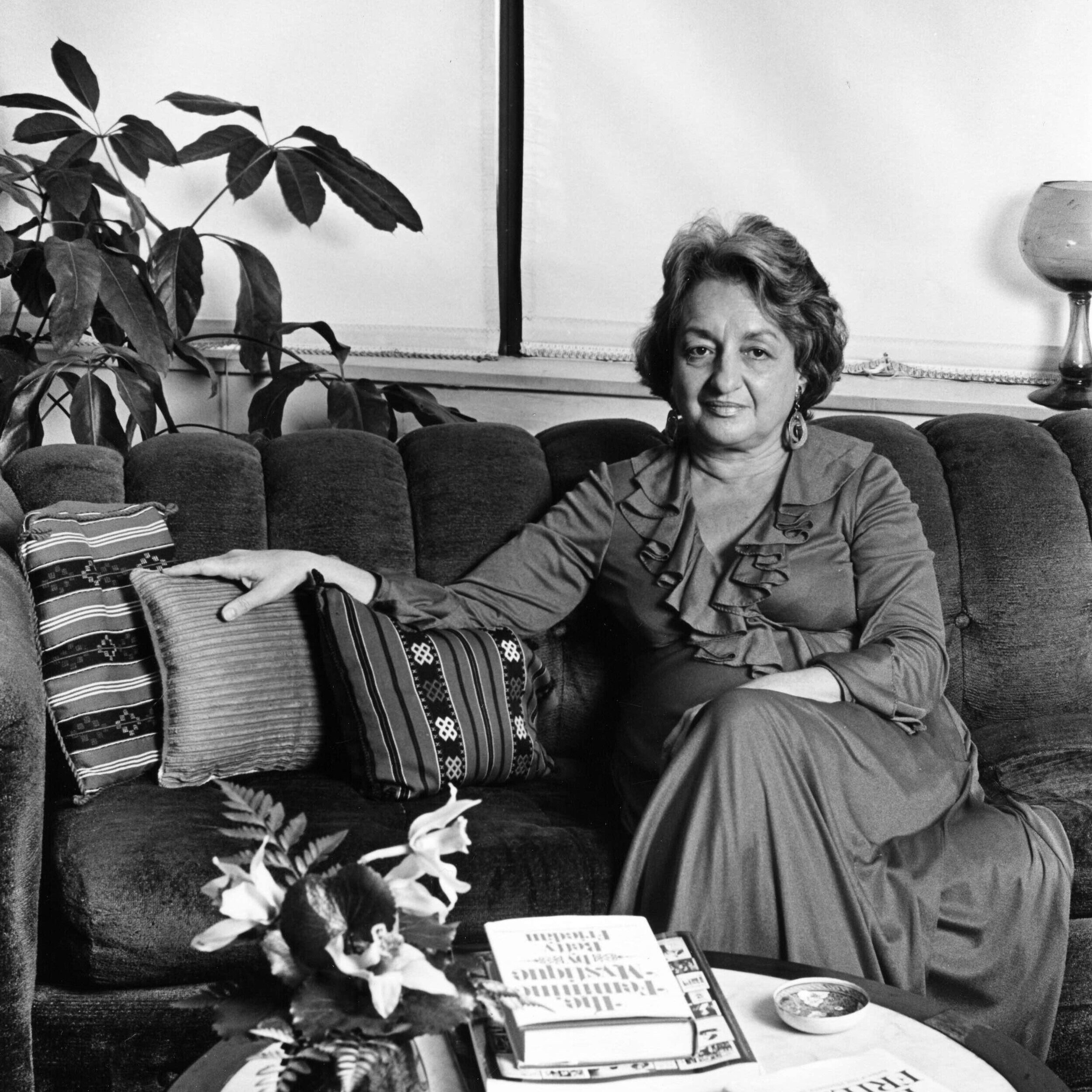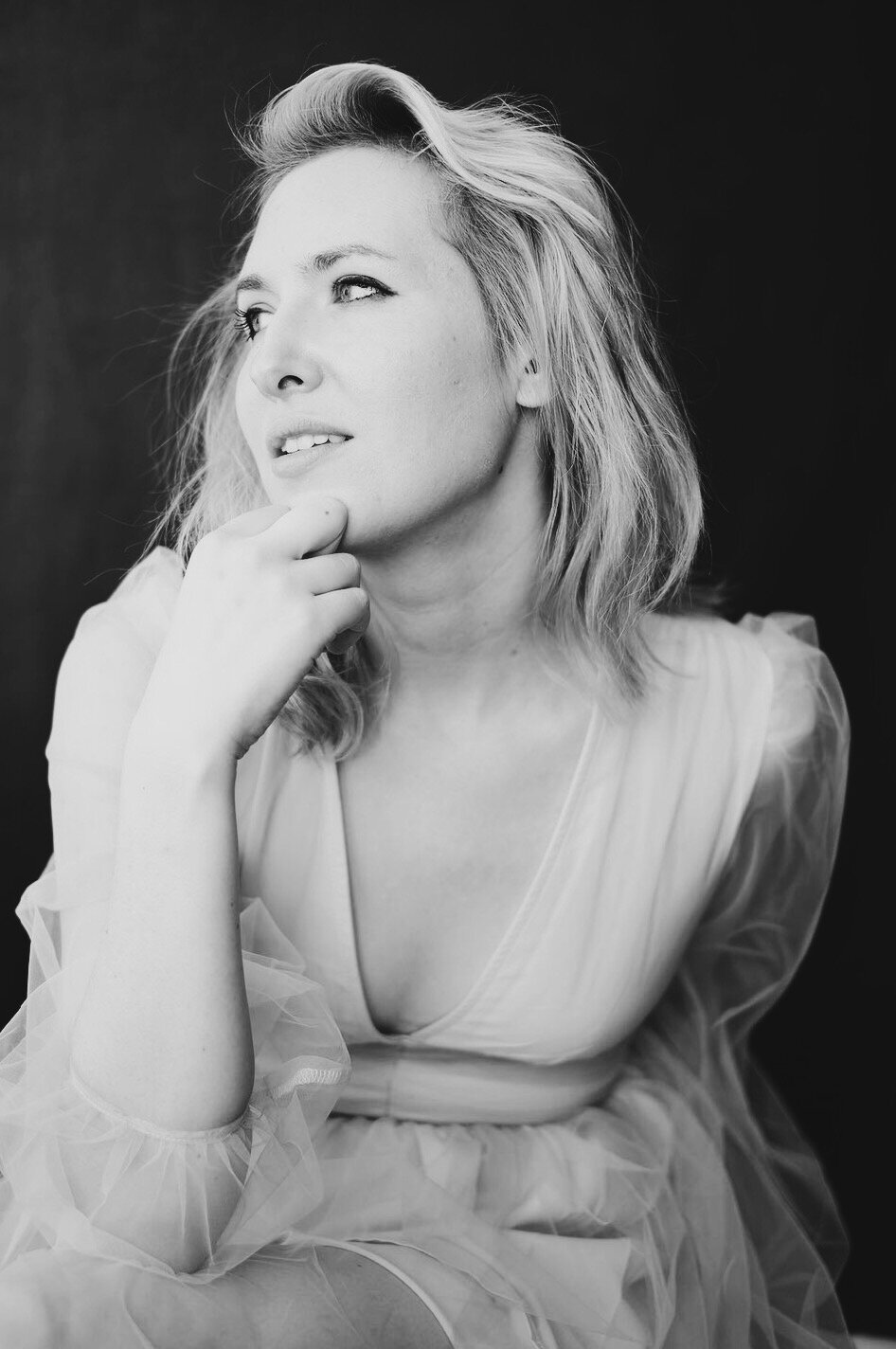
everywoman:
A friedan centennial memoire
a lead commission of the peoria symphony orchestra
through a major grant from the Gilmore Foundation
for the 2021/22 betty friedan centennial
Photo by Lynn Gilbert
Scroll for description of piece, timeline and consortium information, music samples, and composer information
In honor of Betty Friedan’s 100th Anniversary year, the orchestra of Betty’s hometown in Illinois, the Peoria Symphony Orchestra, is leading a consortium commission from Manhattan-based composer Stephanie Ann Boyd to create a Lincoln Portrait-type work honoring Betty’s profound impact on society during and after her lifetime. Deborah Rutter, Michelle DeYoung, and Sirena Huang will be joining Peoria Symphony for the premiere performance in November 2021.
DESCRIPTION OF PIECE.
INSTRUMENTATION: 2222/2221/timp.+ 3 percussion/harp/mezzo-soprano + violin + narrator/strings
Length: 24 minutes
Movements: 1 movement in 5 sections
EVERYWOMAN: A FRIEDAN CENTENNIAL MEMOIRE will take its audience through Friedan’s thoughts and words in a way that traces her own life upon that of feminism’s chronology with a nod towards the formalism in Copeland’s Lincoln Portrait while hitting heartstrings by story-telling in the intimate manner of Barber’s Knoxville: Summer of 1915.
While this work is first and foremost informative and energizing, a call-to-action towards the universal equality that Betty fought for, it will also be a work that reflects three-dimensionally the aspects and qualities of Betty as a human. With texts chosen from her books, speeches, and interviews, the work will be divided into five continuous sections, each with several musical tableaus to set an emotional and timbral background for her words.
With a mezzo-soprano to carry out Betty’s own words as a young woman struggling for freedom from "the feminine mystique", a narrator to speak Betty’s words that gave context and wisdom to so many, and a violin soloist to keep the female voice alive throughout fierce tuttis in the orchestra, this work seeks to draw out the emotions, sympathies, and passions of its audience in a unabashedly potent way that Betty would have been proud of.
PREMIERE SOLOISTS
-

DEBORAH RUTTER: NARRATOR
Deborah F. Rutter began her tenure as President of the John F. Kennedy Center for the Performing Arts on September 1, 2014. Known for emphasizing collaboration, innovation, and community engagement, she is considered one of the most influential arts administrators in the nation. From August 2003 through June 2014, she served as president of the Chicago Symphony Orchestra Association (CSOA), employing her dynamic influence to further enhance the Chicago Symphony Orchestra’s reputation as one of the world’s most highly acclaimed orchestras. Prior to her position in Chicago, she has served as executive director of the Seattle Symphony, executive director of the Los Angeles Chamber Orchestra, and the orchestra manager of the Los Angeles Philharmonic.
-

MICHELLE DEYOUNG: MEZZO-SOPRANO
Michelle DeYoung appears regularly with the New York Philharmonic; the Boston, Chicago, San Francisco, Pittsburgh, London, and BBC symphony orchestras; and the Cleveland, Met, Vienna Philharmonic, and Amsterdam’s Royal Concertgebouw orchestras. She has performed at the Ravinia, Tanglewood, Saito Kinen, Edinburgh, and Lucerne festivals. In Australia she has appeared with the Sydney Symphony, and she recently sang Kundry in concert performances of Wagner’s Parsifal at Opera Australia. Ms. DeYoung has appeared with The Metropolitan Opera, Lyric Opera of Chicago, Milan’s Teatro alla Scala, Bayreuth Festival, Berlin Staatsoper, Paris Opéra, Theater Basel, English National Opera, and Tokyo Opera. She created the role of the Shaman in Tan Dun’s The First Emperor at The Met.
-

SIRENA HUANG: VIOLIN
Praised by The Baltimore Sun for her “impeccable technique…deeply expressive phrasing…and poetic weight," Sirena Huang is one of her generation’s most celebrated violinists. She brings not only technical brilliance and powerful artistry to the stage, but also a profound sense of connection to her audience. Sirena made her solo debut with the National Taiwan Symphony Orchestra in 2004 at the age of nine, and, since then, has performed in seventeen countries across three continents. She has been featured as a soloist with more than fifty prestigious ensembles, including the New York Philharmonic, the Symphony Orchestras of Cleveland, Baltimore, Shanghai, Russia, and Singapore, and the Staatskapelle Weimar in Germany. She has appeared as a guest artist at the Verbier Music Festival, Ravinia Music Festival, Aspen Music Festival, Eastern Music Festival, and many others.
Exclusivity.
Exclusivity for commissioners encompasses the 2021/2022 and 2022/2023 seasons.
We know that thanks to Covid-19, scheduling is still uncertain, and we hope that having two seasons of exclusivity will help ease the scheduling stress that we all know so well by now. This exclusivity period also encompasses several dates that may help with programming ideas, including:
2021-2022
Betty Friedan 100th Birthday Year: 2021
Women’s History Month: March 2022
International Women’s Day: Tuesday, March 8, 2022
Mother’s Day: Sunday, May 8, 2022
2022-2023
80th Anniversary of The Feminine Mystique: February 19th, 2023
Women’s History Month: March 2023
International Women’s Day: Wednesday, March 8, 2023
Mother’s Day: Sunday, May 14, 2023
60th Anniversary of the Equal Pay Act: Wednesday, June 10, 2023
40th Anniversary of Sally Ride becoming the first American woman in space: Sunday, June 18, 2023
120th Anniversary of Marie Curie becoming the first woman to win the Nobel Prize: 2023
Consortium tiers.
This project includes three different consortium tiers so that you can be a commissioner of this work and program it on your educational concert, on your subscription concert, or program it on both concert types for a pro-rated fee. Fees are $1,500 per youth/educational orchestra or individual, $2,500 per mid-size orchestra or institution, and $5,000 per top-tier orchestra or institution.
Timing.
Hardbound Score + Parts in PDF delivered by December 1st, 2021.
Description of sections.
I. Overture
Like Lincoln Portrait, the first section will be an overture of sorts, about four minutes in length, exploring musical themes and melodies that will come back as the work continues. Throughout the piece, the violin will act as a conduit of Betty’s words and feelings - a continuous echo/singular Greek Chorus that immediately distills the mezzo’s mood and melody into material that then gets tossed around by the orchestra. The violin will be an emotional support of the mezzo and together with the narrator, all three will act as a sort of sisterhood triumvirate, a one-two-three-punch of Betty’s intentions, observations, and prose.
II. How things were
The second section will be the most light, carefree, with orchestral tableaus created in which to nestle quotes of Betty’s that mainly come from the prospective of younger women. Some biographical information will be in this section too, painting a portrait of Betty as a young girl right alongside Betty’s words portraying the situation of young womanhood as she and her contemporaries experienced it. A wrenching climax helps this section reach its peak as Betty’s words begin to define her unhappiness with the gender status quo.
"I don't want to be like my mother,
but who do I want to be like?”
III. How things are
The third section will be fiery and immensely kinetic, with excited utterances and interruptions in its structure and with the mezzo singing directly to the audience (breaking the fourth wall); the violin turning her words into emotions and goading on the orchestra in its disjointed, increasing fury. This section will reflect Betty’s deciding to do something about her own unhappiness and the unhappiness she was witnessing in the women around her. A violin cadenza brings the work into the final section.
“Rights” have a dull sound to people who have
grown up after they have been won.”
IV. How things could be
The fourth section will be grand and abundant in its florid melodies and big moments. This section will bring the confidence of Betty’s conclusions to the music. The work will begin its ending as many documentary films do, with the narrator relaying just three or four hard-hitting facts about Betty’s life and accomplishments. The mezzo will reiterate the most intense quote of the whole work before the orchestra gives the final climax.
“Why should women accept this picture of a half-life,
instead of a share in the whole of human destiny?”
V. Postscript
The narrator will read off several of Betty’s accomplishments in a “DID YOU KNOW?” manner.
“the Oak Room at the Plaza Hotel in New York held men-only lunches on weekdays until 1969, when Friedan and other members of NOW staged a protest”
“ a great many aspects of modern life that seem routine today -- from unisex Help Wanted ads to women in politics, medicine, the clergy and the military -- are the direct result of the hard-won advances she helped women attain.”
Work samples.
Lullaby for Sophie, commissioned by BBC Symphony Concertmaster Igor Yuzefovich
Performed with Andrew Litton and Pei-Sian Ng
Sybil violin concerto, performed by Eunae Koh with Nathan Aspinall at the New England Conservatory
Sheltering Voices, commissioned by the Eureka Ensemble
Beyond the Gate, commissioned by the JVL Music in Summer Festival
Composer BIOGRAPHY.
Michigan-born, Manhattan-based American composer Stephanie Ann Boyd (b. 1990) writes melodic music about women’s memoirs and the natural world for symphonic and chamber ensembles. Her work has been performed in nearly all 50 states and has been commissioned by musicians and organizations in 37 countries. Boyd’s five ballets include works choreographed by New York City Ballet principal dancers Lauren Lovette, Ashley Bouder, NYCB soloist Peter Walker, and XAOC Contemporary Ballet’s Eryn Renee Young. Eero, a ballet commissioned by Access Contemporary Music and Open House New York, was written for the grand opening of the TWA Hotel at JFK Airport. Stephanie’s music has been praised as “attractive lyricism” (Gramophone), “[with] ethereal dissonances” (Boston Globe), “[music that] didn’t let itself be eclipsed” (Texas Classical Review), “arrestingly poetic” (BMOP), and “wide ranging, imaginative” (Portland Press Herald).
The 2020/2021 season includes commissions from the Wyoming Symphony, Astral Artists with cellist Tommy Mesa, violinist Megan Healy, pianists Lara Downes, Lise de la Salle, Marta Aznavoorian, Lucille Chung, Susie Maddocks, Adrienne Park, Diane Kaztenburg Braun and Music Street, Sarah Bob and the New Gallery Concert Series, Holly Roadfeldt, Marianne Parker, Eunbi Kim, the Kurganov-Finehouse Duo, and others. This season also includes performances by the Lincoln Trio, Juventas New Music, Jennifer Reason, Shouthouse, Ayanna Witter-Johnson, including concerts at the Kaufman Center, the Boston New Music Festival, the Festival of New American Music, Pianoforte in Chicago, live on Chicago’s WFMT radio station, and elsewhere.
Boyd is a member of the Iceberg New Music composers collective. A critic for American Record Guide and I Care If You Listen, Boyd lives in Manhattan. For concert premieres and red carpet appearances, she is usually dressed by MILLY creator Michelle Smith or Boston-based designer Sasha Parfenova.
Stephanie intensely adores jazz big band screaming trumpets, the smell of camp fires and old cars, that moment when planes leave the ground during takeoff, contemporary fiction, and her cat Bruce.
